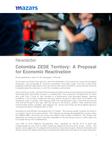
Colombia ZESE Territory: A Proposal for Economic Reactivation
As the days and weeks have gone by, since the declaration of the economic, social and ecological emergency, many proposals for economic reactivation have been made. The truth is that all the proposals made are speculative, since we have to wait how the pandemic control evolves and what is decided about the extension or not of the mandatory confinement.
Only one thing is certain, and that is that all measures taken must be aimed at preserving employment and avoiding the exponential increase in unemployment. This is because unemployment, for those who suffer from it (and for their families) is a phenomenon that generates despair, destroys confidence in the country, breaks the economic system because it slows down consumption and introduces chaos in society. Until February 2020, the unemployment rate in Colombia was around 10% and we thought it was high. With the closure of the tourism, aviation, hotel, restaurant and informal trade sectors, probably -and hopefully not-, by the end of May we will be talking about an unemployment figure of between 30% or 40%.
According to what Minister Carrasquilla told “El Tiempo”, "this second quarter could be the worst in our history in terms of economic activity". Fitch Ratings has already downgraded the country's rating from BBB to BBB-, with which the country may begin to lose investor confidence. The minister also stated that, as another tax reform would be impossible for the time being, there is no other option but to increase the country's indebtedness.
Law 1955 of 2019 (National Development Plan), regulated by Decree 2112 of 2019 and complemented by Law 2010 of 2020 created the Special Social Economic Zones - ZESE-. This regime, which applies for the departments bordering Venezuela (Guajira, Norte de Santander and Arauca) and for the capital cities whose unemployment rates during the last five (5) years have been higher than 14% (rates so far only met by Armenia and Quibdó), grants a benefit of having five years with an income rate of 0% and another 5 years with a rate of 50% of the current rate for the income of those years. As an indispensable requirement to benefit from this regime, the companies must demonstrate a 15% increase in direct employment generated (i.e., employees hired through labor contracts related to the main economic activity), based on the average number of workers hired during the last two years, and such increase must be maintained during the period of validity of the benefit.
A proposal for economic reactivation, without resorting to tax increases or over-indebtedness, is the following: the President, through a decree with force of law, modifies the conditions established in the ZESE regime, indicating that it would apply to all capital cities that, in the last month (and not in the average of the last five years) have had an unemployment rate higher than 20% (and not 14% as it is currently established). The regime would be conditioned to the companies increasing the number of formal workers by 25% (and not 15% as it currently exists). The ZESE regime would also be extended to cover the service regime, which is the regime that has been hardest hit by the crisis. In this way, in addition to the sectors of commerce, industry, agricultural business, health and tourism, which were already included, builders, transporters, owners of restaurants, bars, discotheques and other entertainment venues could be covered, thus generating a reactivation of the economy in those capital cities which, in the end, will be the places with the highest unemployment in Colombia.
In conclusion, extending this ZESE regime to other activities and to capital cities that are going to have high unemployment figures, conditioning it to an (even greater) increase in the number of formal workers, would help companies to survive (because of the income tax benefits) while meeting the Government's objective of generating and preserving formal employment. This proposal would be very easy to implement since the President can do so by decree with the force of law. However, once the term of the economic emergency is over, this provision will have to be ratified by the Congress of the Republic in order to subsist as permanent legislation (Political Constitution art. 215).


